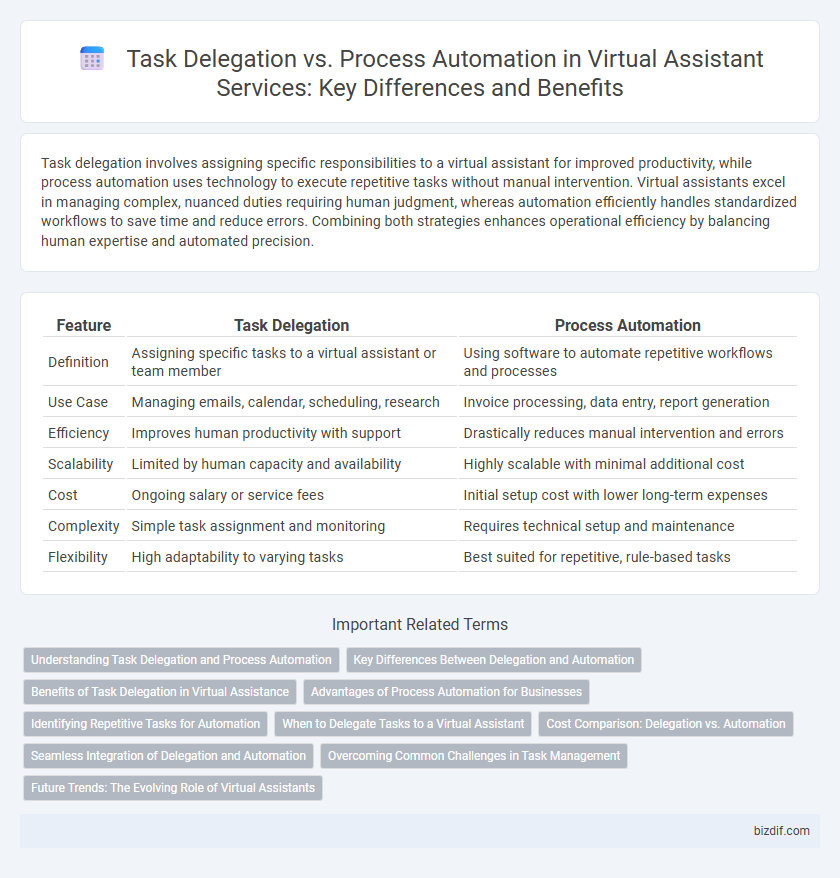Task delegation involves assigning specific responsibilities to a virtual assistant for improved productivity, while process automation uses technology to execute repetitive tasks without manual intervention. Virtual assistants excel in managing complex, nuanced duties requiring human judgment, whereas automation efficiently handles standardized workflows to save time and reduce errors. Combining both strategies enhances operational efficiency by balancing human expertise and automated precision.
Table of Comparison
| Feature | Task Delegation | Process Automation |
|---|---|---|
| Definition | Assigning specific tasks to a virtual assistant or team member | Using software to automate repetitive workflows and processes |
| Use Case | Managing emails, calendar, scheduling, research | Invoice processing, data entry, report generation |
| Efficiency | Improves human productivity with support | Drastically reduces manual intervention and errors |
| Scalability | Limited by human capacity and availability | Highly scalable with minimal additional cost |
| Cost | Ongoing salary or service fees | Initial setup cost with lower long-term expenses |
| Complexity | Simple task assignment and monitoring | Requires technical setup and maintenance |
| Flexibility | High adaptability to varying tasks | Best suited for repetitive, rule-based tasks |
Understanding Task Delegation and Process Automation
Task delegation involves assigning specific responsibilities to virtual assistants or team members to ensure efficient completion of tasks requiring human judgment and adaptability. Process automation uses software tools to execute repetitive workflows without direct human intervention, increasing accuracy and saving time. Understanding the distinction between task delegation and process automation helps businesses optimize resource allocation and enhance operational efficiency.
Key Differences Between Delegation and Automation
Task delegation involves assigning specific jobs to individuals or virtual assistants, emphasizing human judgment and flexibility, while process automation uses software or AI to perform repetitive, rule-based tasks consistently without human intervention. Delegation allows customization and adaptation to complex scenarios, whereas automation excels in scalability and efficiency for predictable workflows. The key difference lies in reliance on human cognition for delegation versus algorithm-driven execution in automation.
Benefits of Task Delegation in Virtual Assistance
Task delegation in virtual assistance enhances productivity by allowing specialized virtual assistants to manage specific tasks efficiently, freeing up valuable time for strategic activities. It improves accuracy and quality by leveraging human judgment and adaptability in complex or nuanced assignments that automation alone may not handle effectively. Task delegation also fosters scalability in operations by distributing workload dynamically, enabling businesses to respond swiftly to fluctuating demands without compromising service quality.
Advantages of Process Automation for Businesses
Process automation reduces human error and increases efficiency by streamlining repetitive tasks with consistent accuracy. It enables businesses to scale operations rapidly without proportional increases in labor costs, enhancing productivity and resource allocation. Automated workflows improve compliance and data tracking, providing valuable insights for continuous process optimization.
Identifying Repetitive Tasks for Automation
Identifying repetitive tasks such as scheduling, data entry, and customer inquiries is essential for effective process automation in virtual assistant services. Task delegation is best suited for complex activities requiring human judgment, while automation targets routine, high-frequency tasks to enhance efficiency and reduce errors. Leveraging AI-powered tools to analyze task patterns enables precise automation, increasing productivity and allowing virtual assistants to focus on strategic responsibilities.
When to Delegate Tasks to a Virtual Assistant
Task delegation to a virtual assistant is ideal for routine, time-consuming activities requiring human judgment, such as managing emails, scheduling appointments, or customer interaction. Process automation suits repetitive, rule-based workflows like data entry or report generation, where software performs tasks without human intervention. Delegating tasks to a virtual assistant maximizes efficiency when activities demand flexibility, adaptability, and nuanced decision-making beyond automation capabilities.
Cost Comparison: Delegation vs. Automation
Task delegation to a virtual assistant often incurs variable labor costs dependent on task complexity and time spent, whereas process automation requires an upfront investment in software development but significantly reduces ongoing expenses. Automation minimizes human error and enhances efficiency in repetitive tasks, resulting in long-term savings that exceed the cumulative cost of continuous delegation. Businesses experience a clearer return on investment through automation by lowering operational costs and scaling processes without proportional increases in payroll.
Seamless Integration of Delegation and Automation
Task delegation enables virtual assistants to assign specific responsibilities to team members, enhancing human oversight and decision-making efficiency. Process automation streamlines repetitive workflows, reducing manual input and minimizing errors through advanced algorithms and AI-driven tools. Seamless integration of task delegation and process automation creates a hybrid system that maximizes productivity by combining human judgment with automated precision, ensuring smooth collaboration and optimized operational performance.
Overcoming Common Challenges in Task Management
Task delegation in virtual assistant services requires clear communication and priority setting to prevent misunderstandings and ensure accountability. Process automation addresses repetitive workflows by integrating tools like Zapier or Microsoft Power Automate to minimize errors and save time. Overcoming challenges in task management involves combining human oversight with automated processes to maintain flexibility and enhance efficiency.
Future Trends: The Evolving Role of Virtual Assistants
Virtual assistants increasingly shift from simple task delegation to sophisticated process automation, driven by advances in artificial intelligence and machine learning. Future trends highlight enhanced integration with enterprise systems, enabling virtual assistants to autonomously manage complex workflows and predictive analytics. This evolution transforms virtual assistants into proactive digital partners that optimize operational efficiency and decision-making in real-time.
Task delegation vs Process automation Infographic

 bizdif.com
bizdif.com